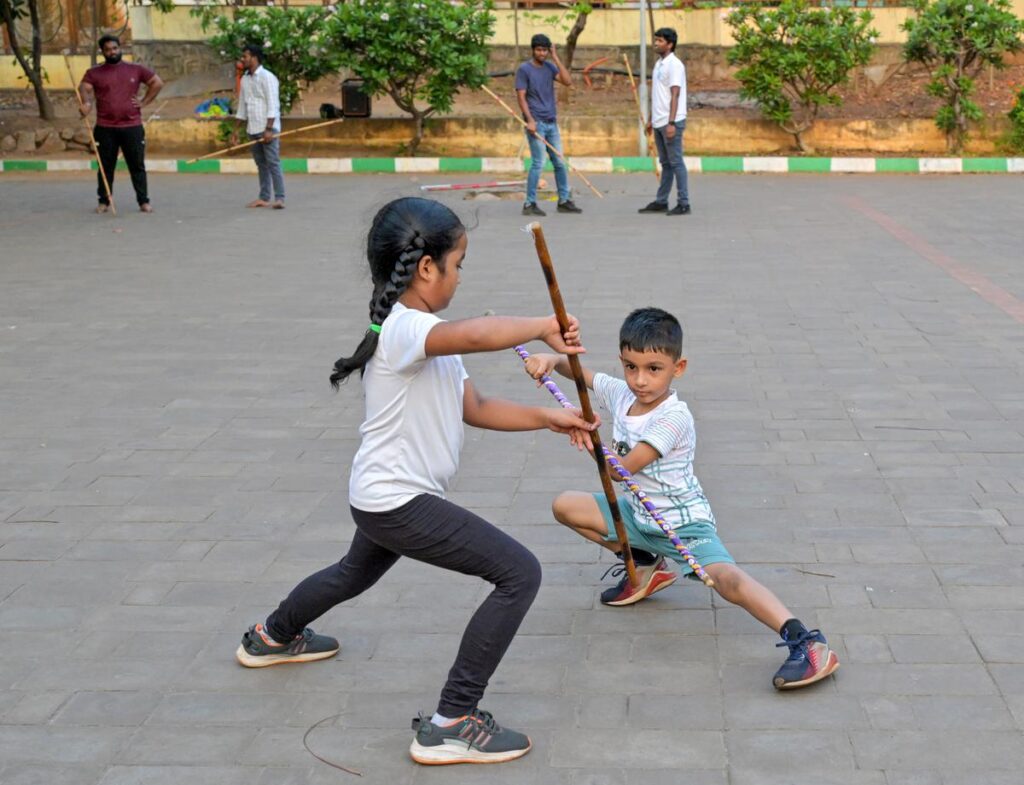One night, VMRDA Central Park suddenly bursts with energy. With sticks in hand, teams of different age groups spring into action. His eyes stay focused and his hands move with precision, executing complex attacks and blocks with ease and grace. The movements flow seamlessly from one technique to another, demonstrating the beauty of the martial art form of Kalasam (stick fencing).
This traditional martial art of Andhra Pradesh has seen a resurgence in Visakhapatnam in recent years thanks to the efforts of coach BA Lakshman Deb and his Institute of Indian Traditional Martial Arts Baldev. The institute currently has more than 50 people between the ages of 5 and 60 undergoing Kalasam training. Students gather in Central Park every morning from 6 a.m. to hone their fluidity of movement with kicks, quick punches, and intricate footwork.
People practice Kalasam, a traditional martial arts sport of Andhra Pradesh, at VMRDA Central Park in Visakhapatnam. | Photo courtesy of KR Deepak
Over the past 15 years, Lakshman has trained hundreds of children and youth in Visakhapatnam and neighboring districts in this unique form of combat that blends skill, discipline and cultural heritage. Many of his students went on to perform in national competitions, further increasing the popularity of the sport in the coastal city.
Hailing from Srikakulam, Lakshman is a third generation Kalasam practitioner who learned the art from his father and grandfather. “When I came to Visakhapatnam to start school, there were very few people coming to learn this sport. Its popularity is increasing every year. People are realizing the importance of traditional martial arts in building fitness. The advantage of this sport is that you can start training at any age,” says Lakshman.
He believes that introducing these traditional sports into schools will go a long way in preserving the region's cultural identity and encouraging younger generations to stay connected to their roots.
Origin and history
The history of Kalasam dates back centuries in Andhra Pradesh. This martial art developed as a means of self-defense against theft and robbery, which was common in villages of the past, and has been passed down from generation to generation over many years. The name “Kala” means stick and “Sam” means battle or battle.
People practicing Kala Sam, a traditional martial arts sport of Andhra Pradesh, at VMRDA Central Park in Visakhapatnam. | Photo courtesy of KR Deepak
Kalasam practitioners say the martial art is more than just an art of self-defense. It's a way of life. “This sport also helps you stay alert and aware of your surroundings,” Lakshman said, adding that this is one of the reasons why the sport is steadily attracting girls. “It teaches you discipline, concentration and self-control. I also feel empowered in many ways,” says P. Sudha, 27, a national silver medalist from Kalasam. Sudha, who is trained in traditional Indian martial arts by Baldev, says his journey into martial arts was a life-changing experience for him. “I have become much more confident in my life, and my flexibility and energy have increased significantly. This journey has given me a lot of strength,” says Sudha.
People practice the traditional martial art of Gatka, which has its roots in Punjab, at the VMRDA Central Park training center in Visakhapatnam. | Photo courtesy of KR Deepak
For 10th grade student B Mahalakshmi, Kalasam has improved her concentration and arm strength. S. Narayana, 58, started training recently as he was looking for a way to kill time after dropping his son off to college and classes in the city. It didn't take long for him to become captivated by the visually captivating and energetic martial arts as he casually strolled through Central Park. “I'm a regular here now. It's a meditative experience that I look forward to every day,” he added.
A girl practices Gatka, a traditional martial art with roots in Punjab, at the VMRDA Central Park training center in Visakhapatnam. | Photo courtesy of KR Deepak
Practitioners undergo rigorous training to master these techniques. This includes a warm-up session of running around part of the park, followed by a series of kicks, blocks and grappling maneuvers. Mr. Lakshman also introduced other traditional martial arts forms such as Gatka, which has its roots in Punjab, Silambam and Kattisam (sword fighting) from Tamil Nadu.
Like many traditional martial arts, Kalasam faces challenges in modern times. Kalasam is struggling to gain prominence amid the allure of modern martial arts and other lifestyle changes, but is not recognized as a sport by the state government. “Despite its ancient roots and a number of national medalists from Andhra Pradesh, Kalasam, unlike other traditional martial arts such as Silambam, which was recognized by the Tamil Nadu government in 2021, has no “We are not even getting recognition,” Lakshman laments. Lack of infrastructure support also hinders this traditional martial art.
This is a premium article available to subscribers only.Read over 250 premium articles every month
You have exhausted your free article limit. Please support quality journalism.
You have exhausted your free article limit. Please support quality journalism.
read {{data.cm.views}} out of {{data.cm.maxViews}} Free articles.
This is the last free article.

